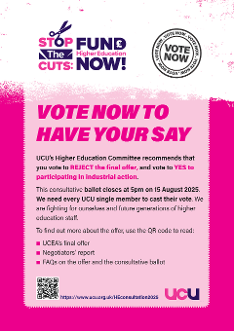
HE consultation 2025
16 July 2025
Negotiations on the 2025/26 pay claim ended; UCU and the other campus unions received the final offer from the employers' representatives Universities and Colleges Employers Association (UCEA). The elected representatives on UCU's higher education committee (HEC) decided to launch a consultative (electronic) ballot on the offer; this page provides further information.
Consultation results
UCU's consultative electronic ballot on the higher education (HE) pay and working conditions offer for 2025/26 closed on Friday 15 August 2025.
The results of the consultation, which have been sent to UCU members in relevant HE branches by email on Tuesday 19 August 2025, are as follows:
1. Do you accept or reject UCEA's final offer?
Accept: 25.5%
Reject: 74.5%
2. Are you willing to participate in industrial action in pursuit of an improved offer?
Yes: 61.2%
No: 38.8%
The turnout was 32%.
The elected representatives on UCU's higher education committee (HEC) will meet on Monday 1 September 2025 to consider the results and decide on next steps.
Key documents
Please read the following documents carefully:
- Full and final offer from Universities and Colleges Employers Association (UCEA) on the 2025/26 New JNCHES pay round
- Joint higher education trade unions' full claim for 2025/26, which was sent to UCEA in March 2025
- Report on the 2025/26 offer, from UCU's elected higher education negotiators
Materials

| Social media graphic (PNG, 1080x1080) [379kb] |

|
|

|
|
Online Q&A: Friday 25 July
UCU is holding an online meeting on UCEA's full and final offer, which will take place on Friday 25 July (14:00-15:30). This will be an opportunity to hear from the elected HE negotiators about the offer itself and ask any questions you may have. UCU is urging all HE members to register here to join the online Q&A (registration closes at 11:00 on Friday 25 July).
Questions will be taken in the briefing itself, and you can also submit questions in advance. All UCU higher education members are entitled to attend this meeting, and those who are from branches that are participating in the 2025/26 JNCHES negotiating round in particular are strongly encouraged to attend.
FAQ on the practicalities of the formal consultation
Which sector is this consultation for?
This is a higher education pay and working conditions formal consultation.
UCU members working in further education, prison education, or adult and continuing education are involved in separate negotiations and campaigns.
How will the consultation be conducted?
The higher education pay and working conditions formal consultation will be conducted via an online ballot.
Eligible UCU members will receive the online ballot via email.
Please look out for an email, sent out by yoursay@ucu.org.uk, with the subject 'IMPORTANT: UCU higher education pay and working conditions consultative ballot'. The ballot email is sent out on Monday 21 July 2025. We advise that you check your spam/junk folder in case the email has been directed there.
What is the consultation timetable?
- Monday 21 July 2025: the formal consultation opens and the online ballot is sent out via email to eligible UCU members
- Thursday 24 July 2025 (09:00): replacement e-ballot request form opens
- Friday 25 July 2025: first reminder email/comms sent out to UCU members who have not yet voted
- Friday 1 August 2025: second reminder email/comms sent out to UCU members who have not yet voted
- Friday 8 August 2025: third reminder email/comms sent out to UCU members who have not yet voted
- Monday 11 August 2025 (12 noon): last day for new members to join UCU (or for lapsed members to re-activate UCU membership) and be automatically included in this formal consultation
- Tuesday 12 August 2025 (12 noon): replacement e-ballot request form closes
- Thursday 14 August 2025: fourth and final reminder email/comms sent out to UCU members who have not yet voted
- Friday 15 August 2025 (17:00): the formal consultation closes.
Which branches or institutions are included in the consultation?
You can check the list of UCU branches/institutions that are included in the consultation.
The list corresponds to UCU branches/institutions that are included in the Joint Negotiating Committee for Higher Education Staff (JNCHES) for the 2025/26 UK-wide higher education negotiations on pay and working conditions.
In total, 137 higher education institutions across the United Kingdom are included.
Why isn't my branch or institution included in the consultation?
Not all higher education institutions in the UK are involved in the Joint Negotiating Committee for Higher Education Staff (JNCHES) for the 2025/26 UK-wide higher education negotiations. UCU and those non-JNCHES institutions negotiate locally on pay and working conditions. Some examples include:
- Birmingham City University
- Cranfield University
- Imperial College London
- Leeds Art University
- Nottingham Trent University
- Queens' University Belfast
- Staffordshire University.
Why is this consultation happening and who made the decisions regarding this?
UCU is a member-led union where decisions are made by UCU members themselves. The democratic mechanisms of the union include the annual Congress (UCU's supreme policy-making body), the further and higher education sector conferences (FESC and HESC), and the elected representatives in the national executive committee (NEC) which is also subdivided into the further education committee (FEC) and higher education committee (HEC).
In summary, the 2025/26 negotiations concluded in July 2025. UCU and the other campus trade unions (Unite, UNISON, EIS and GMB) received the full and final offer from the employers' association Universities and Colleges Employers Association (UCEA). A meeting of UCU's higher education committee (HEC) then took place on Friday 4 July 2025.
At the 4 July 2025 meeting, the elected representatives of HEC considered UCEA's final offer and voted to launch a member consultation on this final offer. The elected representatives of HEC is recommending that members vote to reject UCEA's offer, and vote yes to participating in industrial action.
The materials--including the questions of the consultation and its accompanying documents--were authorised by the elected HE officers (UCU president, vice-president in higher education, and the HEC vice-chairs).
Who are UCU's negotiators for the higher education pay and working conditions 2025/26 negotiations?
UCU has eight higher education pay and working conditions negotiators in total, forming a pool for purposes of formal negotiations with Universities and Colleges Employers Association (UCEA), and trade-union side discussions on a variety of matters. The higher education negotiators are elected annually at UCU Congress, specifically at the higher education sector conference (HESC). You can click here for a list of the 2025/26 negotiators. You can read the negotiators' report here.
Where is the consultation email being sent?
The consultation has been sent to your declared 'preferred email address', where you would normally receive UCU's other national communications, for example UCU's 'Friday Email'.
Please look out for an email, sent out by yoursay@ucu.org.uk, with the subject 'IMPORTANT: UCU higher education pay and working conditions consultative ballot'. The ballot email is sent out on Monday 21 July 2025. We advise that you check your spam/junk folder in case the email has been directed there.
A reminder email was sent out on Friday 25 July 2025 to UCU members who have not yet voted. It was sent out also by yoursay@ucu.org.uk, with the subject 'IMPORTANT: UCU higher education pay and working conditions consultative ballot'. Further reminder emails have been sent out on Friday 1 August 2025, Friday 8 August 2025 and Thursday 14 August 2025.
I have received the consultation email but my voting link does not seem to function. What should I do?
If you have received the consultation email and the voting link does not seem to function correctly, please contact the UCU Campaigns team via campaigns@ucu.org.uk.
What questions appear in the consultation?
The consultation has two questions:
- Do you accept or reject UCEA's final offer? [Accept/Reject]
- Are you willing to participate in industrial action in pursuit of an improved offer? [Yes/No]
The elected representatives of UCU's higher education committee (HEC) is recommending that members vote to reject UCEA's offer, and vote yes to participating in industrial action.
Would UCU know which way I have voted?
No. Your vote is confidential and UCU does not know which way an individual member has voted. At the end of the formal consultation UCU will have the overall results.
Can I change my vote after I have submitted it?
No. Like in all legitimate democratic exercises, once your ballot has been cast (i.e. you have clicked on the 'submit' button in your electronic consultation), it will not be possible for you or anyone to change your vote.
Therefore, please check your vote carefully before you click on the 'submit' button. You cannot request a replacement e-ballot in order to change your vote.
Can I vote more than once?
No. Each eligible UCU member will receive their unique link to vote in the electronic consultation. Please do not share or forward your unique link to anybody else.
Each member can only vote once in the electronic consultation. You cannot request a replacement e-ballot, to attempt to vote again, after you have voted.
I have not received my consultation email. What should I do?
Please look out for an email, sent out by yoursay@ucu.org.uk, with the subject 'IMPORTANT: UCU higher education pay and working conditions consultative ballot'. The ballot email is sent out on Monday 21 July 2025. We advise that you check your spam/junk folder in case the email has been directed there.
A reminder email was sent out on Friday 25 July 2025 to UCU members who have not yet voted. It was sent out also by yoursay@ucu.org.uk, with the subject 'IMPORTANT: UCU higher education pay and working conditions consultative ballot'. Further reminder emails have been sent out on Friday 1 August 2025, Friday 8 August 2025 and Thursday 14 August 2025
If you do not receive your consultation email by Thursday 24 July 2025 (09:00), you can use the replacement e-ballot request form. This form closes on Tuesday 12 August 2025 (12 noon). To use the replacement e-ballot request form, you need to use your unique UCU membership number.
Before you use the form to request a replacement e-ballot, please make sure that:
- you have not already voted (members who have already voted cannot receive a replacement electronic ballot)
- you have checked the spam/junk folder of your email account (preferably log in directly to your email rather than on an account added to your mobile)
- you have checked your personal as well as work email accounts (the e-ballot has been sent to your declared 'preferred email address' where you would normally receive, for instance, UCU's 'Friday Email')
- you work in the higher education sector--further education, prison education and adult and continuing education members have separate negotiations and campaigns
- you work at a university or institution that is part of the Joint Negotiating Committee for Higher Education Staff (JNCHES) for the 2025-26 UK-wide negotiations on pay and working conditions
- you are a full UCU member (retired or student members, postgraduate researchers members, attached/unemployed members, as well as members whose membership has lapsed, are not e-balloted)
- you are ballot eligible (members who are on parental leave, long-term absence, or with a workplace under a different employer to your main branch, or which is outside of the United Kingdom, are not eligible)
- your workplace/employer information is correct (you can check your details by logging into MyUCU).
I do not know or have forgotten my UCU membership number. How do I find out what it is?
If you do not know your UCU membership number, you can send a blank email to mynumber@mercury.ucu.org.uk using the email address we hold for you (usually where you receive the Friday campaigns email and other union communications), and your number will be emailed back. You could also try logging into MyUCU to grab your membership number. If everything fails, you can email UCU's membership department.
Who is eligible to vote?
The formal consultation by default includes:
- UCU full members (standard membership or standard free membership)
- joint union members.
The formal consultation by default excludes:
- student members
- postgraduate researcher members
- attached/unemployed members
- fully retired members
- members whose membership lapsed (please note that standard free membership expires after a period of time—members are warned well in advance if this is happening—and those standard free members can upgrade their membership via MyUCU)
- members whose workplace is outside of the United Kingdom
- members who have cancelled their membership or resigned from the union
- members with a 'ballot exclusion' in place (e.g. parental leave, long-term absence).
Remember that you can check your membership category by logging into MyUCU.
I am about to start parental leave or about to retire; am I eligible to vote in this consultation?
When you receive your consultation email, if at that point you have not yet started parental leave or are not yet fully retired, you should vote in this consultation as normal.
What if I am employed at multiple institutions (and therefore am at multiple UCU branches)?
Each eligible member will receive one consultative ballot i.e. one vote with respect to their primary higher education institution, regardless of how many other institutions they work at. You can check your primary institution of employment via MyUCU.
Is the consultation 'disaggregated' or 'aggregated'?
The consultation takes all eligible UCU members as one bloc and they are not divided into UCU branches, so in that sense it is 'aggregated'.
The anti-trade union 50% turnout threshold applies only to statutory industrial action (postal) ballots, according to the Trade Union Act 2016. The turnout threshold does not apply to formal consultations like this one.
Why is it that we can vote electronically for this consultation but cannot vote electronically/online for industrial action ballots?
The Trade Union Act 2016 mandates that a statutory ballot for industrial action must be conducted by post. It is therefore not possible, as of July 2025, to participate in any UK industrial action ballot electronically/online.
However, this legal requirement does not apply to formal consultations about an employer's offer and therefore this formal consultation can be conducted electronically/online.
What happens after this consultation?
Once the consultation closes and the results are announced, the democratic bodies of the union will meet and determine the next steps. In other words, it is up to UCU members and their elected representatives to decide what the next steps will be.
What if I have a question about the consultation that is not covered here?
The FAQs will be continually updated by UCU staff. If you have a pressing question about the consultation that is not covered here, please contact the UCU campaigns team and we will either reply to you directly or provide a response on this page.
Please also note that it is generally not possible for a FAQ document to cover the often unique circumstances of every member. For casework support or for advice tailored to your precise circumstances, please contact your branch or the relevant regional office. For questions pertaining to your membership record and personal data, please contact the membership department.
- PrintPrint this page
- Share

